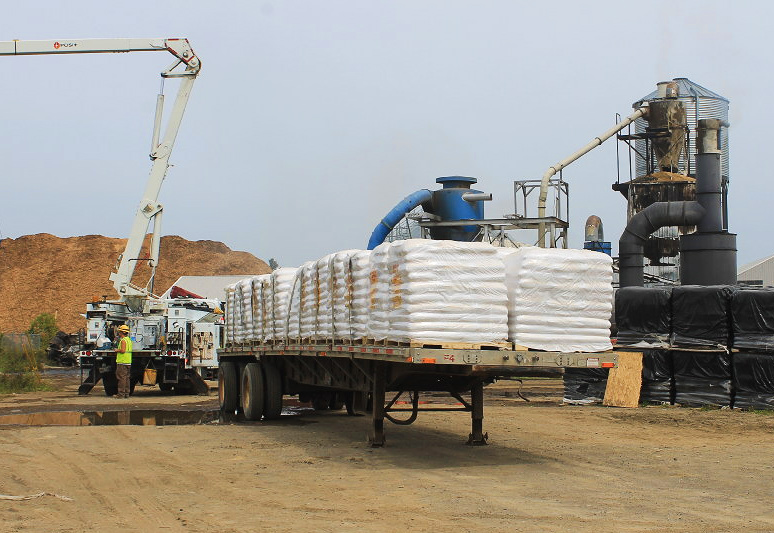
ASHLAND, Maine — Six years ago, Travis Sirois decided that with three of his children in college and unable to help him split firewood and put it in the cellar for the winter, it was time to do something different.
“I asked around, and I was hearing great things at the time about pellet stoves,” the Caribou resident said. “So I decided to buy one for my little house here, and I just love it. It heats the whole place pretty quickly.”
He finds that he is saving several hundred dollars a year by making the switch, but when he heard on the news that a fire had consumed the main production building at Northeast Pellets in Ashland this past summer, he wondered if the savings would last.
“I was afraid that it would drive up the price a bit on us,” he said. “That usually happens when there has been a shortage of something.”
That doesn’t seem to be the case thus far, however, despite the fire that destroyed a chunk of the inventory at the major pellet supplier in Aroostook County, according to store owners and industry officials.
The Aug. 30 fire at Northeast Pellets in Ashland destroyed the main production building. Owner Matt Bell said at the time that the fire destroyed 500 tons of bulk pellets stored in two silos and shut down the operation indefinitely. Bell, who said then that he was insured and would rebuild, could not be reached for comment this week.

The biomass boiler facility at the University of Maine at Fort Kent provides heat and hot water through an underground pipe system to ten buildings on campus, as well as neighboring SAD 27 schools. (Andrew Birden)
John Billings, manager of the Wal-Mart SuperCenter in Presque Isle, said in a recent interview that the store has sufficient supply from what Bell had left in storage that didn’t burn.
“Bell told us that some of the product was not destroyed in the fire,” said Billings. “That has worked out well for our customers because we have been selling pellets pretty steadily. He told us that he might be able to keep us stocked right through the winter and possibly up until April.”
Billings added that he had not seen a big increase in demand and that the price of the inventory supplied by Northeast Pellets has remained the same as it was last year.
Bill Bell, executive director of the Maine Pellet Fuels Association, said he also believed that the fire had no impact on statewide prices. The Maine Pellet Fuels Association was founded in 2008 as a non-profit corporation to promote using pellets for heat and energy production and to support pellet manufacturers and suppliers in meeting common challenges, according to its website.
He said that Northeast Pellets has been able to fill its orders for retail and bulk customers, such as Wal-Mart and the University of Maine at Fort Kent, by subcontracting with other pellet manufacturers like Corinth Pellets. The university contracted this year to buy 1,300 tons of pellets for its biomass boiler which heats via underground pipes ten campus buildings and the nearby Fort Kent Community High School/Valley Rivers Middle School, and Fort Kent Elementary School.
Kerri Watson-Blaisdell, director of marketing, communication and alumni relations at UMFK, said Thursday that Northeast Pellets has been “wonderful” in meeting the needs of the university.
“They have been great right from the start in making sure that all our needs have been met,” she said. “We don’t believe there will be any changes in the future, and it looks to us like pellets are plentiful.”
In Fort Kent, J.R. Sirois, owner of JRS Firewood said that he has not seen an influx of people who are looking to buy more firewood this year. He said that he customarily sells a few thousand cords of wood a year.
Last year, however, Sirois said that he sold about five hundred cords less than normal because customers had wood leftover from the previous mild winter and because heating oil prices had dropped so low.
“This year, I sold all my wood,” he said.
He also said that he does not believe that the fire at the pellet mill has had any impact on his business.
“Perhaps five or ten percent more of my business has been from people who have come to me and said that they have gone back to buying wood, but only because they said that they feel their pellet stove has not put out enough heat,” he said recently. “There seems to be more than enough pellets in the stores.”
One area where Mainers have seen a price increase is in the cost of heating fuel. The Governor’s Energy Office’s retail heating fuel price survey on Monday, Nov. 27, found the current statewide average cash price for No. 2 heating oil was $2.44 per gallon, 9 percent higher since the heating season began in October and about 20 percent higher than this time last year.
The survey also showed the average statewide kerosene price was $3.05 per gallon, which was up 6 percent, and propane prices for heating customers were up 5 percent during the same time period. The kerosene and propane prices were 20 percent and 13.4 percent higher, respectively than they were at this time last year.
“These price increases come on the heels of price spikes immediately following Hurricane Harvey in late August, which affected over one third of the nation’s refining capacity,” according to the energy office press release announcing the survey results.
According to the Governor’s Energy Office, based on average retail prices at the end of November, it cost $17.52 to generate a million British Thermal Units of heat with heating oil. By comparison, the fuel price to generate the same amount of heat with natural gas was $14.73, while the cost with propane was $28.69 per million BTUs. It was $11.36 with cord wood and $15.64 with wood pellets.
The executive director of the Maine Pellet Fuels Association said he feels that the future for the pellet industry is bright in Maine.
“We have found that people who have switched to pellet stoves as a replacement for oil heat really love it,” said Bill Bell. “We are optimistic about the future. People realize that pellets are better than burning oil. They also realize that buying local is the way to go, especially in Aroostook County.”
People in The County, he said, “want to keep people who have worked in the woods all of their lives in business, so they buy their wood. We feel pretty good about this winter.”







